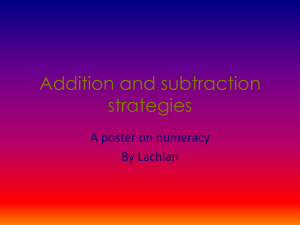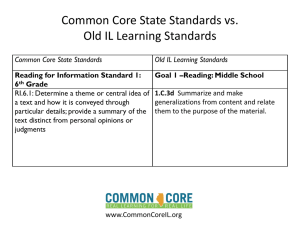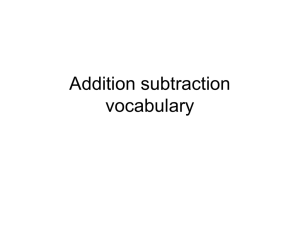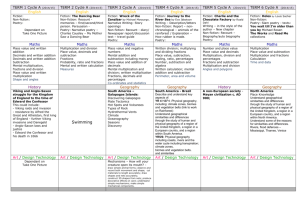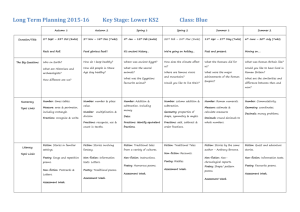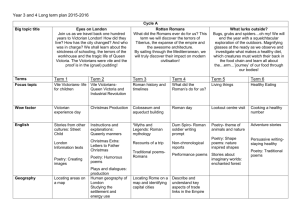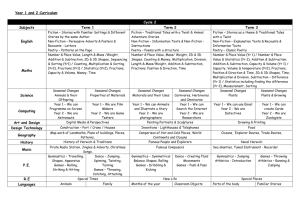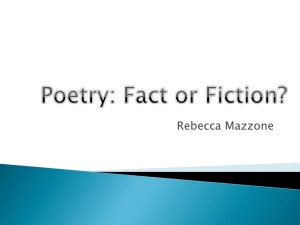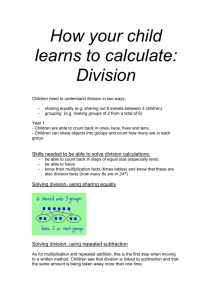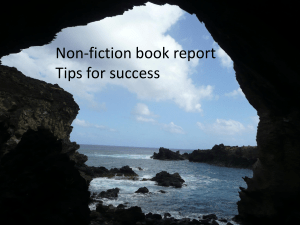Marine Academy Primary Year 1 Curriculum Map 2015
advertisement
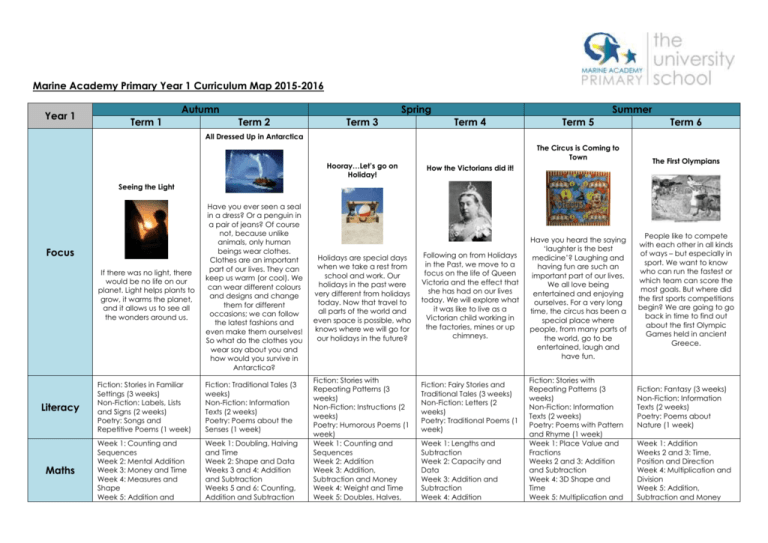
Marine Academy Primary Year 1 Curriculum Map 2015-2016 Year 1 Autumn Term 1 Spring Term 2 Term 3 Summer Term 4 Term 5 Term 6 All Dressed Up in Antarctica Hooray…Let’s go on Holiday! The Circus is Coming to Town How the Victorians did it! The First Olympians Seeing the Light Focus If there was no light, there would be no life on our planet. Light helps plants to grow, it warms the planet, and it allows us to see all the wonders around us. Have you ever seen a seal in a dress? Or a penguin in a pair of jeans? Of course not, because unlike animals, only human beings wear clothes. Clothes are an important part of our lives. They can keep us warm (or cool). We can wear different colours and designs and change them for different occasions; we can follow the latest fashions and even make them ourselves! So what do the clothes you wear say about you and how would you survive in Antarctica? Literacy Fiction: Stories in Familiar Settings (3 weeks) Non-Fiction: Labels, Lists and Signs (2 weeks) Poetry: Songs and Repetitive Poems (1 week) Fiction: Traditional Tales (3 weeks) Non-Fiction: Information Texts (2 weeks) Poetry: Poems about the Senses (1 week) Maths Week 1: Counting and Sequences Week 2: Mental Addition Week 3: Money and Time Week 4: Measures and Shape Week 5: Addition and Week 1: Doubling, Halving and Time Week 2: Shape and Data Weeks 3 and 4: Addition and Subtraction Weeks 5 and 6: Counting, Addition and Subtraction Holidays are special days when we take a rest from school and work. Our holidays in the past were very different from holidays today. Now that travel to all parts of the world and even space is possible, who knows where we will go for our holidays in the future? Fiction: Stories with Repeating Patterns (3 weeks) Non-Fiction: Instructions (2 weeks) Poetry: Humorous Poems (1 week) Week 1: Counting and Sequences Week 2: Addition Week 3: Addition, Subtraction and Money Week 4: Weight and Time Week 5: Doubles, Halves, Following on from Holidays in the Past, we move to a focus on the life of Queen Victoria and the effect that she has had on our lives today. We will explore what it was like to live as a Victorian child working in the factories, mines or up chimneys. Fiction: Fairy Stories and Traditional Tales (3 weeks) Non-Fiction: Letters (2 weeks) Poetry: Traditional Poems (1 week) Week 1: Lengths and Subtraction Week 2: Capacity and Data Week 3: Addition and Subtraction Week 4: Addition Have you heard the saying ‘laughter is the best medicine’? Laughing and having fun are such an important part of our lives. We all love being entertained and enjoying ourselves. For a very long time, the circus has been a special place where people, from many parts of the world, go to be entertained, laugh and have fun. Fiction: Stories with Repeating Patterns (3 weeks) Non-Fiction: Information Texts (2 weeks) Poetry: Poems with Pattern and Rhyme (1 week) Week 1: Place Value and Fractions Weeks 2 and 3: Addition and Subtraction Week 4: 3D Shape and Time Week 5: Multiplication and People like to compete with each other in all kinds of ways – but especially in sport. We want to know who can run the fastest or which team can score the most goals. But where did the first sports competitions begin? We are going to go back in time to find out about the first Olympic Games held in ancient Greece. Fiction: Fantasy (3 weeks) Non-Fiction: Information Texts (2 weeks) Poetry: Poems about Nature (1 week) Week 1: Addition Weeks 2 and 3: Time, Position and Direction Week 4: Multiplication and Division Week 5: Addition, Subtraction and Money Subtraction Week 6: Sequences and Shape SMSC French Computing We’re All Stars! 1. Devising a class charter 2. Getting to know each other 3. Problem-solving 4. Looking after each other 5. Happy playtimes 6. Making choices Sequences and Data Week 6: Sequencing and Place Value Be Friendly, Be Wise 1. Making friends 2. Falling out with a friend 3. Managing anger 4. Anti-bullying 5. Hazards in the home and fire safety 6. Road safety listen attentively to spoken language and show understanding by joining in and responding explore the patterns and sounds of language through songs and rhymes and link the spelling, sound and meaning of words engage in conversations; ask and answer questions; express opinions and respond to those of others; seek clarification and help present ideas and information orally to a range of audiences e-Safety We are celebrating communicate safely and respectfully online, keeping personal information private, and recognise common uses of information technology beyond school. Living Long, Living Strong 1. Keeping clean 2. Growing and changing 3. SRE: families and care 4. Looking after our teeth 5. Staying healthy 6. Setting a simple personal goal Weeks 5 and 6: Addition, Subtraction and Money Daring To Be Different 1. Our likes and dislikes 2. Feeling proud 3. Being special 4. Recognising worries 5. Staying calm and relaxed 6. Standing up for myself speak in sentences, using familiar vocabulary, phrases and basic language structures develop accurate pronunciation and intonation so that others understand when they are reading aloud or using familiar words and phrases read carefully and show understanding of words, phrases and simple writing present ideas and information orally to a range of audiences We are collectors We are story tellers use logical reasoning to predict the behaviour of simple programs use technology purposefully to create, organise, store, manipulate and retrieve digital content Division Week 6: Time Week 6: Addition, Subtraction and Money Dear Diary 1. Asking for help Joining In And Joining Up 2. Feeling loved and cared 1. Listening effectively for 2. Expressing opinions 3. Managing 3. Knowing right and wrong uncomfortable feelings – 4. Needs of living things proud and jealous 5. Developing responsibility 4. Thoughts, feelings and - looking after animals behaviour 6. Who else looks after 5. Dealing with worries animals? 6. Supporting each other appreciate stories, songs, poems and rhymes in the language broaden their vocabulary and develop their ability to understand new words that are introduced into familiar written material, including through using a dictionary write phrases from memory, and adapt these to create new sentences, to express ideas clearly describe people, places, things and actions orally and in writing present ideas and information orally to a range of audiences We are treasure hunters We are painters understand what algorithms are; how they are implemented as programs on digital devices; and that programs execute by following precise and unambiguous instructions create and debug simple programs RE Why are some times special? Theme: Festivals of Light This enquiry explores those aspects of life on earth which are reflected in the pattern of religious and other practices and festivals What special times and seasons can I remember? Why were these times special? Why are some festivals and celebrations special? When do they happen? What do they remember? What do people do and why? What special objects might be used in festivals and celebrations? How might some stories and practices associated with religious and other festivals and celebrations relate to experiences and feelings in our own lives? Why are some symbols and places special? Theme: Symbols including Easter This enquiry explores how religions and beliefs express aspects of human nature in a variety of creative ways What places are special to me? Why are they special? What places are special to members of a religious or belief community? (Buildings used for worship, special places in the home) What do these buildings that are special to religious or belief communities look like? Do they have special places, objects, pictures or symbols? How are these used? What do they tell us about what people believe? How should we live our lives? Theme: Leaders and Teachers This enquiry explores how religious and other beliefs affect approaches to moral issues How does what I do affect other people? What rules and codes of behaviour help me know what to do? What values are important to me, and how can I show them in how I live? (Fairness, honesty, forgiveness, kindness) How do some stories from religions and beliefs and the example set by some people show me what to do? PE perform dances using simple movements and patterns as well as developing balance, agility and coordination and begin to apply these to a range of activities master basic movements including running, jumping, throwing and catching participate in team games, developing simple tactics for attacking and defending master basic movements including running, jumping, throwing and catching, as well as developing balance, agility and coordination and begin to apply these to a range of activities participate in team games, developing simple tactics for attacking and defending Music use their voices expressively and creatively by singing songs and speaking chants and rhymes play tuned and detuned instruments musically listen with concentration and understanding to a range of high quality live and recorded music experiment with, create, select and combine sounds using the inter related dimensions of music Please see International Primary Curriculum (IPC) Topic Booklets for each Unit. Foundation Subjects Art Geography Music Science Geography Science Art Technology History Geography History Art History Art Design Technology Art History Technology Geography History Geography Science Art
